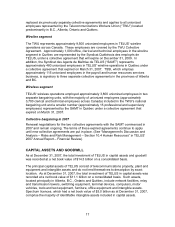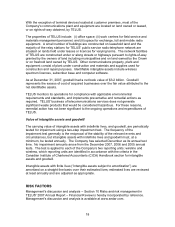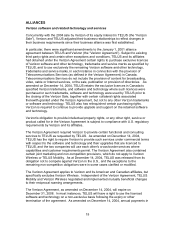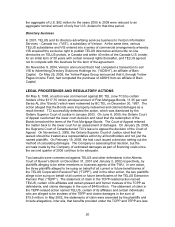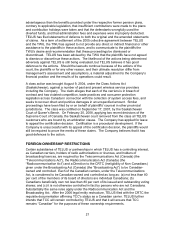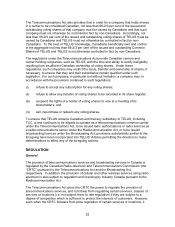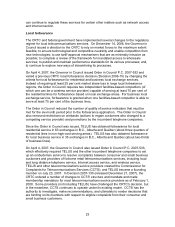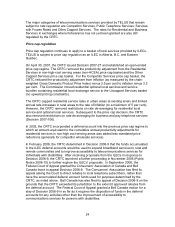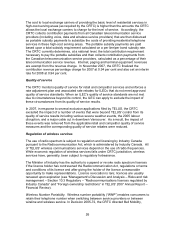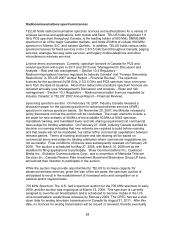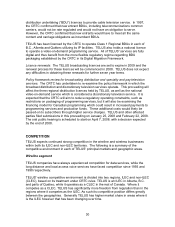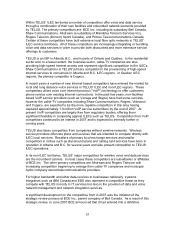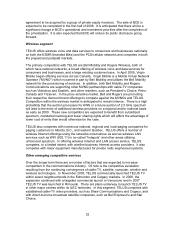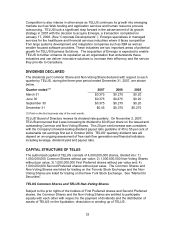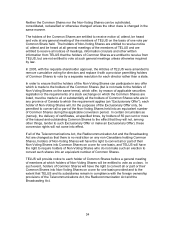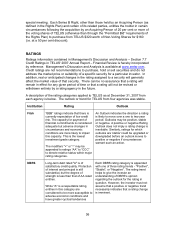Telus 2007 Annual Report Download - page 26
Download and view the complete annual report
Please find page 26 of the 2007 Telus annual report below. You can navigate through the pages in the report by either clicking on the pages listed below, or by using the keyword search tool below to find specific information within the annual report. 26
The cost to local exchange carriers of providing the basic level of residential services in
high-cost serving areas (as required by the CRTC) is higher than the amounts the CRTC
allows the local exchange carriers to charge for the level of service. Accordingly, the
CRTC collects contribution payments from all Canadian telecommunication service
providers (including voice, data and wireless service providers) that are then disbursed
as portable subsidy payments to subsidize the costs of providing residential telephone
services in these high-cost serving areas. The portable subsidy payments are paid
based upon a total subsidy requirement calculated on a per line/per band subsidy rate.
The CRTC currently determines, at a national level, the total contribution requirement
necessary to pay the portable subsidies and then collects contribution payments from
the Canadian telecommunication service providers, calculated as a percentage of their
telecommunication service revenue. Internet, paging and terminal equipment revenues
are exempt from the revenue charge. In November 2007, the CRTC finalized the
contribution revenue percentage charge for 2007 at 0.94 per cent and also set an interim
rate for 2008 at 0.94 per cent.
Quality of service
The CRTC monitors quality of service for retail and competitor services and enforces a
rate adjustment plan and associated rate rebates for ILECs that do not meet approved
quality of service standards. When an ILEC’s quality of service standards are not met
due to circumstances beyond its control, the ILEC can apply to exclude the impact of
these circumstances from its quality of service results.
In 2007, in response to several exclusion applications filed by TELUS, the CRTC
excluded the impact of a number of events that were beyond TELUS’ control from its
quality of service results including various severe weather events, the 2005 labour
disruption, and a major cable cut in downtown Vancouver. As a result, the impact of
these events was removed from the applicable retail and competitor quality of service
measures and the corresponding quality of service rebates were reduced.
Regulation of wireless services
The use of radio spectrum is subject to regulation and licensing by Industry Canada
pursuant to the Radiocommunication Act, which is administered by Industry Canada. All
of TELUS’ wireless communications services depend on the use of radio frequencies.
While economic regulation of wireless services falls under CRTC jurisdiction, wireless
services have, generally, been subject to regulatory forbearance.
The Minister of Industry has the authority to suspend or revoke radio spectrum licences
if the licence holder has contravened the Radiocommunication Act, regulations or terms
and conditions of its licence and after giving the holder of the licence a reasonable
opportunity to make representations. Licence revocation is rare; licences are usually
renewed upon expiration (see “Management’s Discussion and Analysis – Risks and risk
management – Section 10.3 Regulatory – “Radiocommunications licences regulated by
Industry Canada” and “Foreign ownership restrictions” in TELUS’ 2007 Annual Report –
Financial Review).
Wireless Number Portability. Wireless number portability (“WNP”) enables consumers to
retain their telephone number when switching between service providers or between
wireline and wireless service. In Decision 2005-72, the CRTC directed Bell Mobility,



